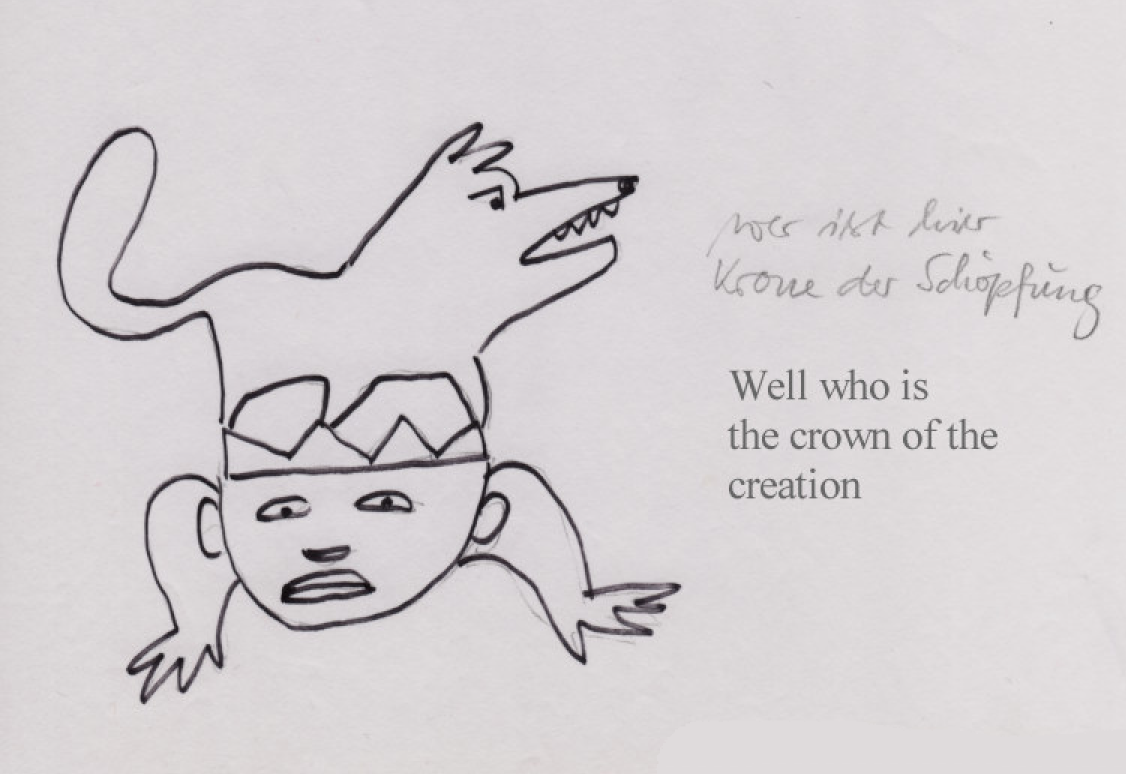Sagen wird’s mal so,
sowohl der ethisch-philosophische Freibrief
zur Zerstörung von beidem:
der ’natürlichen‘ Mitwelt als Ganzem,
als auch spezifisch der Tierheit,
beginnen schlüssigerweise im gleichen Zuge
wie die Empfehlungen,
beides zu vermeiden.
Schlichtweg weil wir beides lediglich mit unserem jetztzeitlichem Blick auf Geschichtsschreibung nachverfolgen können.
Eine abweichende voranthropozentrische und ursächlich nicht- oder anders-anthropozentrische Sichtweise ist uns bei unseren allgemeinläufigen gegenwärtigen Vorgehensweisen in der Geschichtsforschung und unserer Beschreibung von Geschichte, im kleinteiligen Bereich, nicht möglich.
—
Let’s put it this way,
both the ethical-philosophical license
to the destruction of both
the ’natural‘ co-world as a whole,
as well as specifically the animal world,
begin conclusively in the same course…
as the recommendations,
to avoid both.
Simply because we can trace both only with our present time view on historiography.
A deviating pre-anthropocentric and primordially non-anthropocentric or differently-anthropocentric view is not possible for us in our standard current approaches to historical research and our description of history, in the miniscule realm.
—
Digámoslo así
tanto la licencia ética y filosófica
para destruir tanto
el mundo „natural“ en su conjunto,
y específicamente de la animalidad,
comienzan, concluyentemente, en la misma estela
que las recomendaciones,
para evitar ambos.
Sencillamente porque sólo podemos rastrear ambos con nuestra visión actual de la historiografía.
Una visión divergente pre-antropocéntrica y causalmente no-antropocéntrica u otra-antropocéntrica no nos es posible en nuestros enfoques actuales comunes de la investigación histórica y de nuestra descripción de la historia, en el ámbito de la dimensión reducida.
—
Disons-le comme ça,
à la fois la licence éthique et philosophique
à la destruction des deux :
le monde ’naturel‘ dans son ensemble,
et spécifiquement l’animalité,
commencent, de manière concluante, dans le même sillage
que les recommandations,
d’éviter les deux.
Tout simplement parce que nous ne pouvons suivre ces deux aspects qu’avec notre regard actuel sur l’historiographie.
Une vision pré-anthropocentrique et causalement non-anthropocentrique ou autrement anthropocentrique n’est pas possible dans notre approche actuelle de la recherche historique et de la description de l’histoire, à un niveau plus détaillé.
